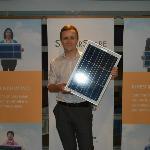 Jeff Harti Apr 6, 2015 11:18 |
Hi Tim,
Thank you for submitting this proposal. Myself and the other fellows look forward to reviewing it and providing comments as soon as we can.
Regards,
Jeff
|
 James Brown Apr 30, 2015 01:33 |
Good work Tim - I hope your proposal is successful. I would pitch it as supporting both Gen 3&4 nuclear and renewables as we will need both to come close to displacing all the fossil fuels. Furthermore, there may be certain environments that are not profitable for nuclear vendors but still appealing for solar etc.
James
|
 Dimoir Quaw May 25, 2015 03:56 |
Hello,
I agree with James. The nuclear and solar option must be explored. Additionally, increasing thermal power plant efficiency will reduce the nuclear fuel consumption and waste production, the number of reactors required and the land utilised for solar energy.
Regards,
Dimoir
|
 Tim Elder May 26, 2015 08:16 | Proposal contributor
James & Dimoir, I'm not opposed to solar, wind, and hydro; but part of my intent is to encourage fast nuclear and thus want to soft-pedal them. Yes, there are probably areas where one of them will be more economical than fast nuclear, even the SMR sizes.
Pressurized water thermal neutron reactors are not where I'm trying to go, although I realize they may be part of the mix. But, for efficiency, their "waste" should become fuel for a fast reactor.
Efficiency is being improved about 100 times in fuel consumption and waste production by the move from thermal to fast reactors.
|
 Dustin Carey Jun 1, 2015 09:04 |
Hi Tim,
I wanted to thank you for an exceptionally well articulated proposal. I very much agree with your premise; there is something radiation - compared to other harmful properties - which seems to spur a disproportionate amount of nervousness and fear. Years ago I was generally anti-nuclear, largely because I was aware of the inefficiency of thermal reactors, the threat of proliferation and the existence of extremely long-lived nuclear waste. On the whole, I had given it insufficient thought and consideration. What really won me over to the potential of nuclear is exactly what you recommend - education. I read James Hansen's Storms of my Grandchildren when it was released in 2009, and information swayed me.
I think you're quite right that changing public opinion will have a positive feedback effect with encouraging congressional and regulatory support, but that federal leadership is a starting point. After all, if the federal government can fund a fusion reactor (ITER), it can pick up where it left off with FAST reactors.
In your proposal you suggest you hope for results within 5 years. What type of results are you implying? Relaunching funding for the FAST research program or having a test reactor performing?
Also, you note beginning with an educational plan to spur congressional action. Have you put any thought into what this campaign would look like?
I knew burning coal emitted uranium and thorium, but the quantity you noted floored me. If US coal use is dying from a thousand cuts, that should be a Monty Python-esque chopping off an arm. Your noting the inability to foster proliferation and the capacity to use radioactive waste and decommissioned weapons are also extremely important selling points.
While I may contest your claim that renewables can't satisfy energy demands, I heartily agree that advanced nuclear should be part of a sustainable energy mix
Best regards,
Dustin Carey
Catalyst
|
 Tim Elder Jun 4, 2015 01:47 | Proposal contributor
Dustin: Thanks for your kind words. There may be more books that I haven't seen yet, but the 2 I suggest are at the end of the proposal. "Plentiful Energy" is my personal favorite since I like the reports on the research. "Prescription for the Planet" is the one I read first (of the 2;) I was amazed at the numbers in the first half, but thought the second half was a bit like science fiction--but it takes visionaries to get things going.
I don't really know what results to expect; I tend to be reluctant to predict too much for fear I'll be wrong, but I will hope for adequate funding and measurable progress toward the goal.
Since I had no expectations of winning (More now after I look at some of the titles!), I have not thought very much on how to go next. I will want to do something even if I don't win, but will have to get some advice on how to get the information to national and international people.
NIMBY will hinder any proposal whether it be fast nuclear, solar, wind, or hydro. That is part of the reason I suspect solar and wind will not be able--they require too much area to obtain the large amounts of power that the world will need.
|
 Paul Wolfram Jun 13, 2015 08:50 |
1. Life cycle analyses of energy carriers have shown that GHG emissions are inherent to all fuels including nuclear power. These emissions are caused indirectly due to material and energy requirements during raw material extraction, facility construction and decomissioning and transportation processes. Thus, nuclear power is not a zero-carbon technology.
2. Just because we already consume mild toxins (car exhaust, alcohol) and therewith damage our bodies, this does not justify to introduce technologies that expose us to further damaging substances such as radiation from nuclear power.
3. As far as I understand you mentioned the advantage of fast-breeders to reduce nuclear waste, which is great of course. But what about the risk of nuclear power plant disasters? Can fast breeders solve this problem? I doubt it to be honest.
4. Renewable energies can provide a reliable electricity mix that creates almost no waste and significantly lower GHG emissions compared to fossil fuels and nuclear power even when indirect emissions are considered.
|
 Tim Elder Jun 13, 2015 07:24 | Proposal contributor
paulw: I replied to each of your points this morning, but it timed out. So my time was wasted! Apparently it doesn't consider typing as an activity!
|
 Tim Elder Jun 13, 2015 08:09 | Proposal contributor
paulw: #1 Indirect GHG emissions are a fact for the various fuels; not for coal, but for most of the others the construction GHG will be established up front, thus will always decrease over the life generating system, becoming probably negligible at the end-of-life. Also note that for fast nuclear, mining will not be required since we have so much depleted uranium on hand left over from the enrichment required for nuclear weapons and thermal nuclear plants.
|
 Tim Elder Jun 13, 2015 08:11 | Proposal contributor
paulw: #2 Yes, we are exposed every day to mild toxins, but we are also exposed every day to cosmic ray background radiation--everybody no matter where we are. Some will be exposed to more than the average, because they live in areas with higher natural radioactivity. I have read that some small amount of radiation appears to be good for us. The LNT (Linear, No Threshold) theory has been shown to be not true. Also note that if we start using fast nuclear technology, and it replaces coal and gas generating plants, we will actually reduce our exposure to toxins including U and Th since coal plants emit these in surprising quantities.
|
 Tim Elder Jun 13, 2015 08:57 | Proposal contributor
paulw: #3 No human activity can be zero risk; things like riding in a car have risk, staying in my home has risk because an airplane may fall on it. But fast nuclear plants can reduce the risk of a nuclear disaster, because they are safer than thermal nuclear plants. Remember that the proposal includes a statement than it is safer in a nuclear facility than in a school setting. By the way, most nuclear "disasters" are not really all that bad when it comes to loss of life. Something I saw very recently is that Fukushima had only one life lost and it was from the stress of relocating, not from radiation exposure.
|
 Tim Elder Jun 13, 2015 08:36 | Proposal contributor
paulw: #4 Renewable energies have a problem with intermittancy I believe; this does not sound reliable to me. Expanding their capabilities to the world-wide needs will have huge difficulties with NIMBY. Renewables have much lower GHG emissions than fossil fuels, but I disagree about fast nuclear where the emissions will be similar. Either will provide a great improvement over coal & gas.
|
 Dennis Peterson Jun 16, 2015 03:52 |
Even after we run out of existing supplies...one-year fuel supply for a one-gigawatt fast reactor weighs about one ton and is about the size of a beach ball. And since it operates at atmospheric pressure, it doesn't require the oversize containment that conventional reactors do. It can be quite compact. I have trouble imagining how such a small installation requiring so little fuel could have less carbon impact than the vast fields of windmills and solar panels producing the same amount of energy.
Also worth noting: the IFR was tested against loss of electrical power, the exact scenario that took down Fukushima. It shut down quietly with no damage, just due to the physics of the fuel and coolant. No active safety systems required.
|
